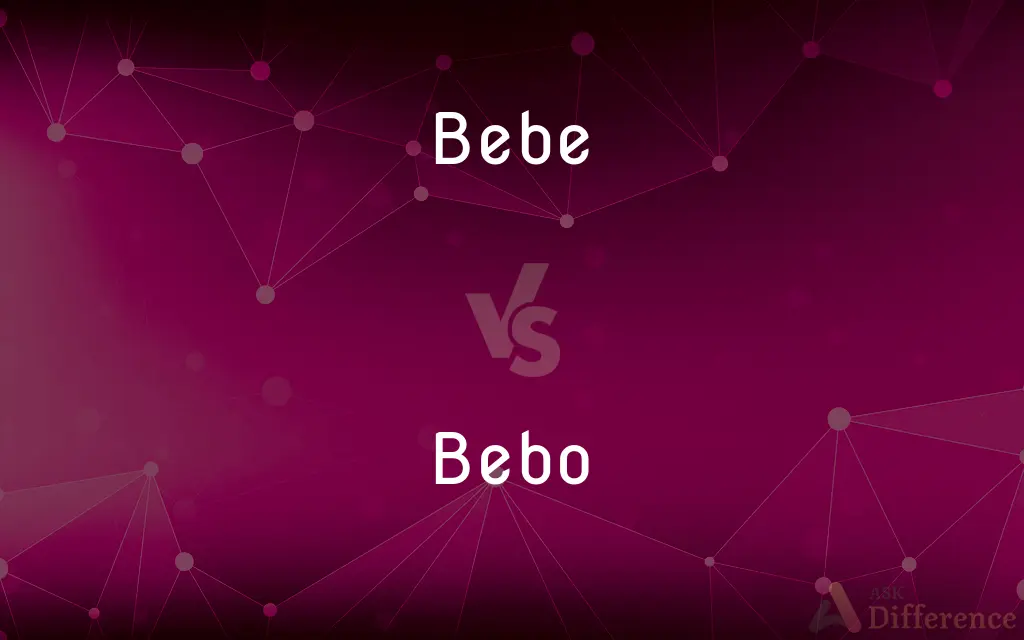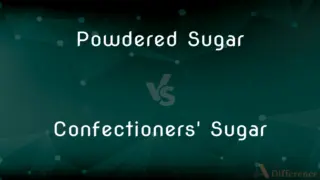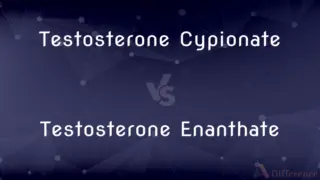Bebe vs. Bebo — What's the Difference?
By Tayyaba Rehman & Urooj Arif — Published on January 30, 2024
"Bebe" typically means "baby" in Spanish and Portuguese, often used as an endearment. "Bebo" is the first-person present tense of "beber" in Spanish, meaning "I drink."

Difference Between Bebe and Bebo
Table of Contents
ADVERTISEMENT
Key Differences
"Bebe" in Spanish and Portuguese is a noun that translates to "baby" in English. It's used to refer to an infant or a very young child. "Bebo," however, is a verb form in Spanish. It is the first-person singular present indicative form of "beber," which means "to drink." Thus, "bebo" translates to "I drink."
In usage, "bebe" is often employed in familial and affectionate contexts, implying tenderness or endearment towards a young child. In contrast, "bebo" is used in a completely different context, typically in reference to the action of drinking. It’s a straightforward statement about the speaker’s current action or habit.
Culturally, "bebe" can be found in various expressions and songs, reflecting the universal affection for babies. "Bebo," on the other hand, is more utilitarian in nature, used in everyday conversation to express a simple, personal action related to consuming liquids, whether it’s water, juice, or alcohol.
Regarding grammatical classification, "bebe" is a noun and maintains its form regardless of the subject. However, "bebo" is a verb that changes its form depending on the subject and tense. It's specific to the speaker and the present tense in Spanish.
Both "bebe" and "bebo" are common in Spanish-speaking countries, but their meanings and uses are distinctly different. "Bebe" evokes emotional and familial connections, while "bebo" is a practical term used in everyday language to describe an action.
ADVERTISEMENT
Comparison Chart
Part of Speech
Noun
Verb (first-person present indicative)
Meaning
Refers to an infant or young child
Indicates the action of drinking by the speaker
Usage Context
Familial, endearment
Descriptive of an action
Cultural Significance
Used in affectionate expressions and songs
Common in everyday language
Grammatical Variability
Fixed form
Changes form based on subject and tense
Compare with Definitions
Bebe
"Bebe" is used to refer to an infant.
Nuestro bebe acaba de empezar a caminar.
Bebo
"Bebo" expresses a personal habit or action.
Bebo té verde para relajarme.
Bebe
"Bebe" in songs and literature symbolizes innocence.
La canción habla sobre un bebe y su mundo maravilloso.
Bebo
"Bebo" means I drink in Spanish.
Yo bebo agua para mantenerme hidratado.
Bebe
"Bebe" often indicates a relationship of affection.
Todos en la familia adoran al nuevo bebe.
Bebo
"Bebo" is the first-person present tense of "beber."
Bebo café todas las mañanas.
Bebe
"Bebe" denotes a very young offspring of humans.
Ella cuida de su bebe con mucho amor.
Bebo
"Bebo" is used in contexts of consuming liquids.
En la fiesta, bebo un poco de vino.
Bebe
"Bebe" means baby, a young child.
El bebe duerme tranquilamente en su cuna.
Bebo
"Bebo" indicates the speaker's action of drinking.
Cuando tengo sed, bebo agua fría.
Common Curiosities
What does "bebe" mean in English?
"Bebe" translates to "baby" in English.
How is "bebo" used in a sentence?
"Bebo" is used to indicate the speaker is drinking, as in "Yo bebo agua."
Is "bebo" specific to any type of drink?
No, "bebo" can be used for drinking any kind of liquid.
Can "bebe" be used for both genders?
Yes, "bebe" can refer to a baby of either gender.
Can "bebo" be used in past tense?
No, "bebo" is specifically present tense; past tense would be "bebí" or "bebía."
Is "bebe" only used for human infants?
Primarily, yes, "bebe" is used for human infants.
What is the infinitive form of "bebo"?
The infinitive form is "beber."
How do you conjugate "beber" for "we drink"?
"We drink" is "bebemos" in Spanish.
Is "bebe" ever used metaphorically?
Yes, "bebe" can be used metaphorically to denote something young or innocent.
Can "bebo" be used in future tense?
No, the future tense would be "beberé."
Does "bebe" have synonyms in Spanish?
Synonyms include "infante" or "niño pequeño," though these can have slightly different meanings.
Does the word "bebe" change in plural form?
Yes, the plural of "bebe" is "bebes."
Are there any cultural expressions with "bebe"?
Yes, there are many songs and expressions in Spanish that use "bebe" affectionately.
What is the negative form of "bebo"?
The negative form is "no bebo."
Is "bebe" used in both Spanish and Portuguese?
Yes, "bebe" is used in both languages with the same meaning.
Share Your Discovery

Previous Comparison
Powdered Sugar vs. Confectioners’ Sugar
Next Comparison
Testosterone Cypionate vs. Testosterone EnanthateAuthor Spotlight
Written by
Tayyaba RehmanTayyaba Rehman is a distinguished writer, currently serving as a primary contributor to askdifference.com. As a researcher in semantics and etymology, Tayyaba's passion for the complexity of languages and their distinctions has found a perfect home on the platform. Tayyaba delves into the intricacies of language, distinguishing between commonly confused words and phrases, thereby providing clarity for readers worldwide.
Co-written by
Urooj ArifUrooj is a skilled content writer at Ask Difference, known for her exceptional ability to simplify complex topics into engaging and informative content. With a passion for research and a flair for clear, concise writing, she consistently delivers articles that resonate with our diverse audience.
















































